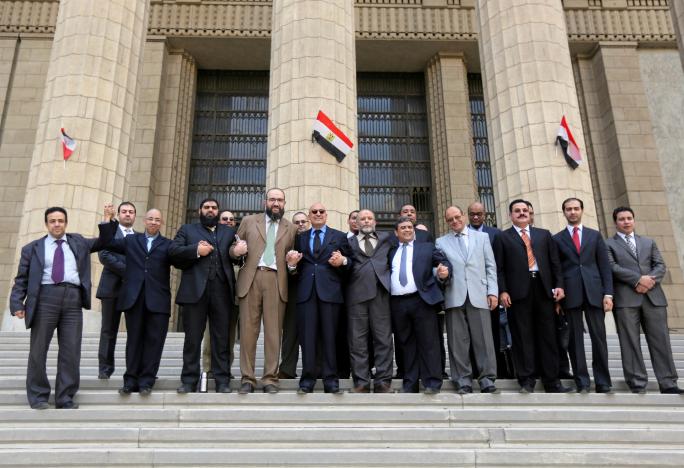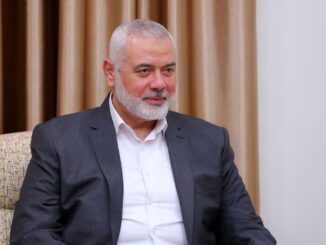
Reuters has released a special report on the crackdown on Judges in Egypt after the military coup of 2013.
The report narrates the story of the dozens of judges who were removed from office by Abdel-Fattah Al- Sisi as part of a crackdown that was aimed at bringing the judiciary under tighter government control.
Those judges met on the evening of July 21, 2013 on the Armada, a floating restaurant docked where the Nile glides past the leafy suburb of Maadi in southern Cairo where they discussed the military coup led by Abdel Fattah al-Sisi against Egypt’s first democratically elected President Mohamed Morsi.
One of the judges, Mohamed Nagi Derballah, suggested issuing a statement condemning the takeover that had taken place three weeks earlier. The document he drafted that evening called for a return to “constitutional legitimacy” – a democratic government – but steered clear of directly criticizing the military or demanding Morsi’s reinstatement, as reported by Reuters.
More than 30 judges signed the document that night, but over the following days, 75 judges signed the statement and in a news conference on July 24, a senior judge read it out.
However, nearly half the judges who signed the statement were removed from office throughout those three years “as part of what they say is a crackdown by Sisi aimed at bringing the judiciary under tighter government control,” said Reuters.
“Judicial records show that since 2013, disciplinary committees formed by the Supreme Judiciary Council, the governing body which sits on top of the Egyptian judicial ladder, have forcibly retired 59 judges – including 32 of the 75 who signed the Armada statement. Some of the judges who signed the Armada letter recanted and were not disciplined,” according to Reuters’ special report.
An Egyptian judicial disciplinary committee has the power to reprimand judges, transfer them to other posts, force them to retire, or clear them of wrongdoing. After the committee rules on a case, Sisi signs off on the decision.
Most of the 59 judges, forced into retirement, were ruled to have broken a law that prohibits judges from “practicing politics.”
“The real reason they were pushed out was to scare other judges into toeing the government line,” said 25 of the judges. They say their dismissals ‘were a deliberate attack on one of the last institutions that can check the power of the state and protect Egyptians’ basic freedoms.”
Mohamed Zein al-Abedeen, 35 years old, who was the youngest judge to be forced out, said: “They (the regime) don’t want to allow any dissenting voices. We should all have the state’s point of view.”
Ahmed al-Khatib, another judge who lost his job, said, “Anyone who is a reformist or has critical opinions gets filtered out. They are targeting those calling for judicial reform or judicial independence.”
On the other hand, Egypt’s justice ministry denied there was any attempt to reshape the Egyptian judiciary.
Judge Khaled al-Nashar, the Assistant to the Minister of Justice for Parliamentary and Media Affairs said,” “The idea of revenge against specific judges or reshaping the judicial branch is absolutely not true. We have in Egypt the principle of judicial independence.”
“The executive branch does not interfere in the affairs of the judicial branch. In all honesty the executive branch does not and will never have the ability to reshape the judiciary. The president himself says openly in speeches that he does not interfere in the affairs of the judiciary.” !!
After January Revolution in 2011, military tribunals were used by the ESCAF to silence the political activists. Moreover, after the military coup in 2013, “al-Sisi has been more prepared to intervene,” said Reuters.
A year after he seized power, al-Sisi has cracked down on Islamist opposition groups, secular activists, journalists, students – and, the judges say, the judiciary.
Judge Mohsen Fadli, a former deputy to Egypt’s top judge and another who said he was forced to retire because he signed the Armada statement said, “The judiciary in Egypt is being used as a tool by the regime for revenge
The judges also allege that former colleagues who helped force them out did so because it was likely to advance their own careers. Reuters said that,” Three senior judges have been made justice minister since 2013, including the incumbent. The three had submitted legal complaints against colleagues, ruled that colleagues had broken the law on expressing political opinion, or sat on disciplinary boards. At least seven other judges who submitted complaints against colleagues have been given senior positions in the justice ministry.”
The judge who drafted the initial complaint against those who signed the Armada letter was Ahmed al-Zend who was the president of the Judges Club, a social group and informal professional association until 2015. Zend was a harsh critique to Morsi when he was president and publicly backed al-Sisi after the military takeover. Sisi made Zend justice minister in 2015.
AL-Sisi dismissed him as minister in March, after Zend told a talk show host on live television that he would imprison anyone who broke the law, even if he were Prophet Mohammad.
Nashar, the justice ministry spokesman, said Zend’s appointment as minister was not connected to his role in the Armada case, and that the two other ministers and seven officials were all appointed on merit.
Nashar further rejected any suggestion Hossam Abd al-Rehim, the current minister, had benefited from his role in the Armada case. While Abd al-Rehim had been the chair of the Supreme Disciplinary Council as it considered the case, he had been appointed a minister before the judicial disciplinary committee ruled, Nashar said.
In fact, Zend and 15 other judges drafted a legal complaint against the group of 75 judges who called for a return to civilian rule after Morsi was overthrown.
The complaint accused the 75 judges of belonging to Morsi’s now-banned Muslim Brotherhood movement, spreading lies, slandering the military, abusing their positions, inciting violence, and participating in politics.
The judges in question, the complaint said, had “delivered a statement amongst Muslim Brotherhood protesters” at a protest camp and “accused the Egyptian military of usurping legitimacy.”
All 25 judges interviewed rejected those allegations.
As a result, the Minister of Justice referred the 75 to a disciplinary council set up to hear the case. The council immediately set up an inquiry headed by Judge Sherine Fahmy, an investigative magistrate.
According to Judge Fadli, the former deputy to Egypt’s top judge and one of those forced to retire, Fahmy was a Zend ally.
In response, the accused judges say the inquiry was a shame. “They say fellow judges they brought in to act on their behalf, as is their right, were not allowed to mount defenses. They also say they were not given access to investigation documents, and were not confronted with evidence. Some say they were not informed of the times and locations of several hearings, “reported Reuters.
The judges also say, and documents confirm, that only four of the 75 were given the opportunity to defend themselves before the committee.
There were other issues. In the report he submitted to the disciplinary committee, “investigating magistrate Fahmy concluded that one judge had allowed an Islamist candidate to cheat in 2008 parliamentary elections. But no parliamentary election took place in 2008,” said Reuters.
In March 2014, 31 of the 75 judges were found to have practiced politics. Those found guilty appealed. The Supreme Disciplinary Council, an internal tribunal of last resort, upheld the ruling in March this year and increased the number found to have breached the law to 32.
One of the youngest of the dismissed judges is 42-year-old Hossam Mikawy said “judges like him, young and outspoken, were targeted because they supported the 2011 uprising and pushed for judicial reforms.”
“It is disgusting that they just label anyone who calls for reform a Muslim Brotherhood member,” he said. “Judges are there to protect freedoms … I did not sign this statement because I wanted to defend Morsi. I would have signed it even if (Morsi’s opponent in the presidential election) Ahmed Shafiq was in his place.”
The statement avoided the word “coup” in order not to take sides, Mikawy said. It simply called on all parties to engage in dialogue and respect election results.
He continued, “There is a deliberate manufacturing of fear.” “Judges are now afraid to issue verdicts that would make the government unhappy. They now know they can lose their jobs.”
Another of the judges forcibly retired was Islam Alam al-Din said investigators used a photo he had posted on Facebook as evidence against him in the case. The photo showed him at his young son’s school in the United Arab Emirates, he said.
Alam al-Din was living there because he was on loan to the Emirati court system. But investigators alleged the photo showed the pair “in a Muslim Brotherhood protest camp,” Alam al-Din said.
Four judges said that Zend would later formalize the tactic of monitoring social media. They say that when Zend became justice minister in 2015, he formed a department to monitor judges’ social media accounts.
Mohamed Nagi Derballah, the man who drafted the letter, was also forced from his job. After the 2011 revolution, Derballah had helped write Egypt’s new constitution and was on track to become Egypt’s top judge, but after the military took over, it suspended the new constitution and Derballah was charged with practicing politics in two separate cases.
He said that now he has been banned from practicing law and from traveling and Junior judges who once competed for his attention now avoid him in social gatherings.
Derballah said he has never been an Islamist and did not support Morsi. He proudly recalls a meeting in which he criticized Morsi to his face for attempting to reshape the judiciary and granting himself new powers.
Derballah said he had been bound by oath to protect “the election results, which was why he signed the Armada statement.”
But Nashar, the justice ministry spokesman, said a judge’s role ends after ensuring a free and fair election. If the people will turn against a freely elected president, he said, “it is none of your business as a judge.”
Crackdown against political opposition, freedom of expression and express shape Egypt’s face after the military coup in 2013. Human rights organizations condemned in various occasions crackdown of political, human rights activists as well as journalists, calling for free trial and the release of political prisoners.



